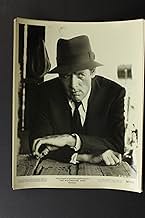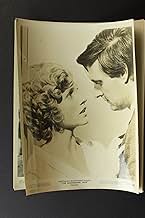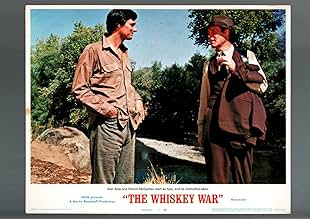Aggiungi una trama nella tua linguaA federal agent attempts to make some real money before the alcohol ban is lifted so he sets his sights on the whiskey cache of an old army buddy.A federal agent attempts to make some real money before the alcohol ban is lifted so he sets his sights on the whiskey cache of an old army buddy.A federal agent attempts to make some real money before the alcohol ban is lifted so he sets his sights on the whiskey cache of an old army buddy.
- Boyd Caswell
- (as Richard Peabody)
- Young Wife
- (as Terry Garr)
Recensioni in evidenza
I'm very much a fan of Patrick McGoohan, and I admire his penchant for playing a widely varying range of roles, so I eagerly anticipated one of McGoohan's usual tour-de-force performances in 'The Moonshine War'. I was disappointed, not only by McGoohan but by the entire film.
Patrick McGoohan (born in the United States but raised in Ireland) uses his American accent here as a "revenooer" (federal agent) in the Ozarks during the Depression, tracking a family of moonshiners. Alan Alda, with a Li'l Abner cornpone accent, plays the eldest son in the family: not the leader, but it's clear he's going to inherit leadership after the patriarch dies.
I was keenly anticipating a battle of wits (and dirty tricks) between Alda and McGoohan. I was disappointed. Alda's hillbilly keeps outflanking and outwitting McGoohan's federal agent all through the film. McGoohan is subjected to all sorts of humiliating defeats. This movie is the closest Patrick McGoohan ever came to playing Wile E. Coyote: the guy who loses every engagement keeps coming back for more punishment ... and keeps losing again.
It doesn't help that Alda's character and his relations (who are all criminals) are all depicted sympathetically, while McGoohan's character (a low-paid agent in a dangerous job, putting his neck on the line with no back-up, to enforce the law) is depicted unsympathetically. We're meant to cheer for Alda each time he humiliates McGoohan.
The screenplay is by Elmore Leonard, based on his novel. I don't much fancy Elmore Leonard, but friends of mine who are Leonard fans have told me that this movie is a good example of his work.
Some of the local colour in this movie truly irritated me, such as the heavy-set waitress who can't pronounce "Coca-Cola" correctly: she keeps calling it "Co'Cola". After I saw this movie, I learnt (from someone who grew up in the Deep South) that the film is actually quite accurate in its details. In Georgia, where Coca-Cola's corporate headquarters are located, they really do call it "Co'Cola".
"The Moonshine War" was directed by Richard Quine, a former actor who became a (slightly better than average) director with several excellent films to his credit. Quine eventually directed Peter Sellers in the remake of "The Prisoner of Zenda" and in "The Fiendish Plot of Dr Fu Manchu". Reliable reports state that Sellers bullied Quine unmercifully throughout production of both films, and Quine was permanently traumatised by the experience. This was probably a major factor in Quine's eventual suicide.
The movie is based in the last days before the repeal of the 18th Amendment of the U.S. Constitituion which made it a crime to import, buy or drink alcohol. A complete failure in regard to legislation. The principle of the movie revolved around a LARGE stash of 8 year old whiskey owned by Alan Alda's char acer that distributors would of paid twice their weight in gold for. What Mr. MacIntyre's missed was that the time and place were during the Great Depression in the Kentucky, the American South, which was triple-poor compared to the rest of the world. Alan Alda's character was not part of a family, but a member of a community who made whiskey to sell to the rest of the country because the soil of their farms could produce little else to keep them from going hungry. It was choice many people made during those times. The whiskey for Alda's character was a legacy from his father and his ticket out of the poor house along with his lady friend. Part of the dialog was leaving to go live in California, the eternal promise land even by today's standards.
Patrick McGooan's character was CROOKED, as in criminal, Federal officer looking to make himself rich from his old Army buddy "Son Martin's" whiskey. He was anything, but hard working and when confronted by the black man with the shotgun, even less so. Thus, his contact with Richard Widmark and his gang. When the gang found they no longer needed McGooan's character they turned on him. In turn Alda's neighbors turned on him, when the gang, posing as MORE Federal officers started raiding his neighbors stills and homes. They refused him service and credit at the local store among other things. I saw this flick as teenager and the storyline has remained with me for decades. It seemed that much of the story revolved around the old nursery rhyme about Chicky Licky who no one wanted to help make the bread, but they sure wanted to help eat it. The same thing is definitive in this movie, but the ending was beautiful in the destruction of the bad guys and the reconciliation of the neighbors. I'm surprised this movie isn't out on DVD or VHS.
Considering the times this film depicts, that is the closing days of Prohibition and in the depths of the Great Depression, it is also hard to take these characters too seriously, for after all they are all on the make in some way, which makes this so much fun to watch.
You don't give a damn who wins !!!!
Patrick McGoohan's character as a crooked G-Man is par for the course, and Richard Widmark's corrupt dentist with his little sexy bundle in tow and other hangers-on may not be your average Louisvillian, though I imagine he does need a fair amount of medicinal alcohol for his private use, especially around Derby Week !!! (After all, what's a Mint Julep without bourbon.)
Alan Alda is quite good as 'Son Martin', who is sitting on a fortune in moonshine, patiently waiting for repeal.
Add all the local color provided by a good supporting cast, and you have a watchable movie, though you do have all these Hollywood types trying to get by with bad Southern drawls and over-the-top acting.
One highlight is seeing a young Teri Garr strip naked at gunpoint,(at least I think it was her, since we had a brief rear view. Could have been a body double).
Best watched with a full jar !!!!
Lo sapevi?
- QuizThe federal Volstead Act did not prohibit drinking alcohol. It prohibited manufacture, sale, transport, distribution and import/export. It was left to the states to make laws to prohibit possession and consumption. All the states did, but Nevada's was repealed on state constitutional grounds.
- Blooper(at around 1h 20 mins) Frank Long leaves payment for his room on the hotel registry. The top $1 bill is a modern "small size" Federal Reserve Note with a green seal. The first of such notes went into circulation in 1963, some 30 years after the movie's prohibition era, which ended in 1933. When small size US currency replaced "large size" currency in 1928, all $1 bills were silver certificates displaying dark blue seals and serial numbers.
- Citazioni
Mr. Baylor: If'n the law needs upholdin' in these parts, Mr. Frank Long, I uphold it, *I* take care of it.
Frank Long: You all confiscatin' whisky, Mr. Baylor?
Mr. Baylor: Well, I reckon you might say so - a swig at a time. Royce, give this ol' Long boy a sample of our white lightenin', will ya?
[Frank takes a swig]
Mr. Baylor: Right good stuff, huh, Mr. Long? Ah, it'd be a cryin' shame to throw that out in the ground just because some titless old women figure a feller oughtin' to drink that, wouldn't it? I'm askin' you now, wouldn't it?
- ConnessioniFeatured in Shooting the Moonshine War (1970)
I più visti
- How long is The Moonshine War?Powered by Alexa
Dettagli
- Data di uscita
- Paese di origine
- Lingua
- Celebre anche come
- The Moonshine War
- Luoghi delle riprese
- Stockton, California, Stati Uniti(location shooting)
- Azienda produttrice
- Vedi altri crediti dell’azienda su IMDbPro
- Tempo di esecuzione1 ora 40 minuti
- Mix di suoni
- Proporzioni
- 2.35 : 1
Contribuisci a questa pagina






































